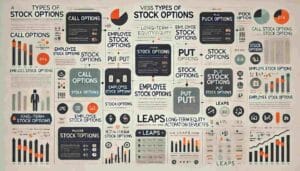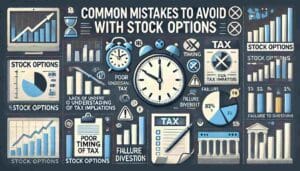Reliable Toronto Stock Option CPA: Expert Tax Solutions You Can Trust
Stock options can seem confusing, but they are important to understand, especially if you work for a company in Toronto. Employee stock options allow workers to purchase company shares at a predetermined price. This can help employees make money if the company grows. But when it comes to taxes, things can get tricky. That’s why…
Stock options can seem confusing, but they are important to understand, especially if you work for a company in Toronto. Employee stock options allow workers to purchase company shares at a predetermined price. This can help employees make money if the company grows. But when it comes to taxes, things can get tricky. That’s why it’s smart to talk to a Toronto stock option CPA—an accountant who knows all about stock options and how they are taxed. In this post, we’ll explain how stock options work, how they are taxed, and why a CPA can help you.
What Is Toronto Stock Option CPA?

A Toronto stock option CPA is an accountant who helps people understand how stock options work and how to pay the right amount of taxes. Stock options are often given to employees by companies, but the tax rules can be different depending on whether you work for a stock options private company Canada or a public company.
A stock options accountant Toronto knows the local tax laws and can help employees make the best decisions with their stock options. They will help you understand when to use your stock options, how to pay taxes, and how to save money.
Also Read : How long can I have company gear before selling it?
Overview of Stock Options and Their Importance
Employees can buy shares of their employer’s company at a fixed price through stock options. Employees can buy shares at a discount as the company’s value rises, which enables them to sell these shares for a profit at a later date. Stock options are popular because they can help employees make money, especially when companies are growing.
For employees, stock options can be a great benefit. But if you don’t know how to handle the taxes on them, it could cost you a lot of money. A Toronto stock option CPA can help you make the right choices to save money and avoid problems.
What Are Stock Options?
Definition and Purpose
A stock option is a deal between an employee and the company they work for. It permits the employee to buy shares at the exercise price, which is a certain amount. The goal is to buy the shares at a low price, hold on to them, and then sell them later for a higher price to make a profit.
Companies give stock options to:
- Motivate Employees: Employees are more likely to work hard to help the company grow if they own part of it.
- Keep Employees: Stock options usually require employees to stay with the company for a certain time before they can use them. This keeps employees committed.
However, stock options can be confusing when it comes to taxes. This is why it’s important to understand how they work and how much tax you’ll owe.
Types of Stock Options

In Canada, there are two main types of stock options: Canadian-Controlled Private Corporations (CCPCs) and public companies. The tax rules for these two types of companies are different.
Canadian-Controlled Private Corporations (CCPCs)
If you work for a CCPC, the tax rules are easier. Stock options private companies in Canada have better tax treatment than public companies. Here’s why:
- Tax Deferral: You don’t have to pay taxes right away when you get stock options from a CCPC. You only pay taxes when you sell the shares. This means you can wait until the value of the shares goes up before you pay taxes.
- Stock Option Deduction: If you hold the shares for at least two years, you can get a stock option deduction in Canada. This allows you to pay taxes on only half the money you make when you sell the shares.
How This Helps Employees
Tax deferral gives employees more time to plan when to sell their shares. It also helps save money on taxes by letting you decide when to pay them.
Public Companies
If you work for a public company, the tax rules are stricter. Here’s what happens:
- Immediate Taxation: With public company stock options, you must pay taxes when you use the option, not when you sell the shares. The amount that you pay in taxes is the difference between the shares’ market value and the exercise price.
- No Deferral: Unlike with CCPC stock options, you can’t wait to pay taxes. You have to pay taxes as soon as you use your stock option, even if you haven’t sold the shares yet.
This means you could owe taxes before you have made any money from selling the shares.
How a Toronto Stock Option CPA Helps in Tax Planning

A Toronto stock option CPA knows all the tax rules and can help you avoid paying more taxes than you need to. They can:
- Time Your Taxes: A CPA can help you figure out the best time to use your stock options so you don’t pay too much tax.
- Find Deductions: If you’re eligible for a stock option deduction Canada, a CPA will make sure you get the full benefit.
- Plan Stock Sales: A CPA can help you plan when to sell your stock options to minimize taxes and maximize profit.
For example, using a stock option tax calculator Canada can help you figure out how much tax you will owe before you use your stock options.
Toronto Stock Market and Stock Options
The Toronto Stock Exchange (TSX) is one of the biggest stock markets in the world, and many public companies listed on it offer stock options to their employees. While public company stock options don’t offer the same tax benefits as CCPC stock options, they can still be a good way to build wealth.
However, the stock market can be unpredictable, so it can be hard to know when to use your stock options. This is why having a stock options accountant in Toronto can help—they can guide you based on your financial goals and give you good advice.
Stock Options Advice in Toronto

If you work in Toronto, getting the right stock options advice in Toronto is important to make the most of your stock options. A CPA who specializes in stock options can help you figure out when to use your stock options, how to save on taxes, and how to maximize your benefits. Whether you work for a CCPC or a public company, getting professional advice will help you make smart decisions and avoid mistakes with your stock options.
Tax Implications of Stock Options

Stock options can help you make money, but they also come with taxes. If you don’t know when and how to pay taxes on your stock options, you could be hit with an unexpected tax bill. That’s why working with a CPA is a smart move.
Overview of Taxation
The tax rules for stock options depend on whether you work for a CCPC or a public company. For CCPC stock options, you only pay taxes when you sell the shares, and you can deduct half of the benefit if you hold the shares for two years. For public company stock options, you pay taxes when you use the options, and the full benefit is taxed as income.
Comparison Table: CCPC vs. Public Company Tax Treatment
Type of Company Tax Timing Tax Expectorated when shares are sold half of the benefit can be deducted if shares are held for two years public Company Taxed when options are exercised full benefit taxed as employment income.
This shows how the timing of taxes is different for each type of company. This is why planning is important, and a CPA can help with that.
Recent Developments in Legislation
Recently, Canadian tax laws have changed how stock options are taxed. There are now two types of stock options:
- Qualified Stock Options: These stock options still get better tax treatment, like deferrals and deductions.
- Non-Qualified Stock Options: These options are now taxed as regular employment income, meaning you must pay taxes as soon as you use the option.
Because tax rules can change, it’s important to talk to a CPA who knows the latest updates.
How to Choose the Right Toronto Stock Option CPA

Choosing the right CPA is important. Here’s what to look for:
- Experience with Stock Options: Make sure the CPA has experience with stock options for both CCPCs and public companies.
- Good Communication: Your CPA should be able to explain things in a simple way, not in complicated accounting terms.
- Reputation: Seek out referrals or reviews from previous clients to identify a CPA with a solid track record.
Automation Tools for Stock Option Management

Managing stock options can be tricky, but there are tools that can help. Some companies offer Deferred Share Units Canada as part of their employee benefits, and there are tools that can track these units, calculate taxes, and help you figure out when to use your stock options.
CPAs often use or recommend these tools to help manage stock options. This makes it easier for you to keep track of your options and avoid mistakes.
Key Benefits of Working with a Toronto Stock Option CPA
There are many reasons to work with a Toronto stock option CPA. Here are some of the main benefits:
- Save on Taxes: A CPA can help you pay less tax by finding deductions, using smart tax strategies, and making sure you are taking advantage of tax deferrals.
- Stay Compliant: Tax laws can change, especially for stock options. A CPA will keep you updated and make sure you’re following the latest rules. They’ll also know about special tax issues like Quebec stock option deduction and Canadian tax on US stock options.
- Personalized Advice: Everyone’s financial situation is different. A stock options accountant in Toronto can give you advice that fits your unique needs.
Understanding Stock Options in Global Markets
If you’re working in Canada but have US stock options, it’s important to understand how Canadian tax on US stock options works. Even though the stock option comes from a foreign company, Canadian tax laws still apply. This can get complicated, especially with different currencies and tax systems. A Toronto stock option CPA can help you understand Canadian tax laws while also keeping track of international tax issues to avoid paying taxes twice.
Stock Options as a Long-Term Investment
Stock options aren’t just a way to make money quickly—they can also be part of your long-term financial plan. Holding onto stock options for a long time can bring big rewards if the company’s stock price keeps going up. For Canadian stock options, you may get extra tax benefits if you hold onto the shares for two years. A stock options accountant Toronto can help you figure out the best strategy for holding your options as part of your long-term financial goals.
The Role of a CPA in Retirement Planning with Stock Options
Stock options can also help with retirement planning. If you’re getting close to retirement, you may wonder how to manage your Canadian stock options to get the most out of them. A Toronto stock option CPA can help by showing you when to use your stock options and how to spread out any tax payments to avoid paying too much in a single year. This is especially useful if you have Deferred Share Units Canada as part of your retirement plan. A CPA can help you avoid any surprises and make sure your stock options help you retire comfortably.
Common Mistakes to Avoid with Stock Options

One common mistake is not understanding the tax rules for stock options. This can lead to owing more taxes than expected or missing out on important deductions like the stock option deduction in Canada. Another mistake is using stock options at the wrong time, especially when the stock market is unpredictable. A Toronto stock option CPA can help you avoid these mistakes by giving you clear advice on the best way to manage your stock options. They will make sure you don’t lose money or pay more taxes than you need to.
How Stock Options Impact Overall Financial Planning
Stock options can be a great way to make money, but they also affect your overall financial plan. When you think about using your stock options, you should think about how it fits into your bigger financial goals. Are you saving for a big purchase, like a house, or planning for your children’s future? A Toronto stock option CPA can help you include your stock options in your financial plan so that you can make smart decisions for your future. They can guide you on how to use your stock options in a way that helps you save and avoid taking on too much risk.
Stock Options and Estate Planning
Stock options can also be important in your estate planning. You may want to pass your wealth, including stock options, to your family members. The tax rules for passing stock options to your heirs can be complicated, but a Toronto stock option CPA can help you figure out the best way to do it. Whether you want to pass your stock options during your lifetime or as part of your will, a CPA can make sure your stock options are transferred in a way that saves on taxes and helps you leave a financial legacy.
Toronto Stock Exchange today
The Toronto Stock Exchange (TSX) is one of the largest and most influential stock markets in the world, and today, it continues to shape the financial landscape of Canada and beyond. Known for its diverse listings, the TSX features companies from sectors like finance, energy, technology, and mining. Investors are closely watching market trends today as global economic shifts, interest rates, and commodity prices influence trading activities. With fluctuating stock prices and market indices, the TSX serves as a vital hub for both seasoned traders and new investors. Staying updated with the Toronto Stock Exchange today is essential for making informed financial decisions.
FAQs
What are stock options?
Stock options are agreements that let employees buy shares of their company’s stock at a set price for a certain amount of time. Companies often use them as a way to pay or reward their workers.
How are stock options taxed in Canada?
When it comes to taxing stock options, it depends on whether the company is a Canadian-Controlled Private Corporation (CCPC) or a public company. For CCPCs, you don’t have to pay taxes until you sell the shares. However, for public companies, you have to pay taxes as soon as you use the stock options.
How do Non-Qualified Stock Options (NSOs) and Incentive Stock Options (ISOs) vary from one another?
ISOs usually give better tax benefits because employees don’t have to pay taxes until they sell the shares. On the other hand, NSOs are taxed as regular income when used. The exact tax situation can be different for each person.
Why should I consult a CPA for stock options?
A CPA can help with tax planning by making sure you follow the rules, improving your tax plan, and helping you avoid expensive mistakes with stock options.
What common mistakes do people make with stock options?
Common mistakes include not planning for taxes, giving the wrong information about money from stock options, and not knowing the best time to use those options. These mistakes can make you pay more in taxes.
How does a CPA help with tax planning for stock options?
A CPA looks at your money situation to find the best time to use stock options, helps you use tax breaks, and makes sure you follow tax rules to pay less money.
What recent changes have been made to the taxation of stock options in Canada?
New laws have changed the rule for stock option income. Before, people could deduct 50% of this income, but now they can only deduct one-third if their total income from stock options and capital gains is more than CAD 250,000.
How do I report stock options on my tax return?
When reporting stock options, you need to show the taxable benefit on your T4 slip. This benefit is the difference between how much the stock is worth when you use the option and the price you paid. Different rules apply based on whether you have ISOs or NSOs.
Can I defer taxes on my stock options?
If you work for a CCPC, you can defer taxes until you sell your shares. However, for public companies, taxes are due when you exercise your options
What qualifications should I look for in a Toronto Stock Option CPA?
Find a CPA who knows a lot about Canadian tax rules for stock options, has experience with financial reporting and following the rules, and has helped clients improve their tax plans for equity compensation.
Conclusion
Stock options are a great way to make money, but they come with complicated tax rules. Whether you work for a CCPC or a public company, understanding how stock options are taxed is important for getting the most out of them. That’s why working with a Toronto stock option CPA is a smart move. They can help you pay less in taxes, follow Canadian tax laws, and make sure your stock options help you achieve your financial goals.
Call to Action
If you have stock options or are thinking about getting them, now is a great time to talk to a Toronto stock option CPA. They can help you understand your options, minimize your tax bill, and make the best decisions for your financial future. Don’t wait—reach out to a stock options accountant in Toronto today!
